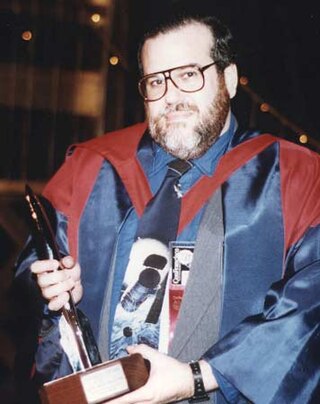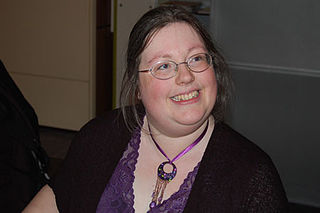Related Research Articles

Science fiction fandom or SF fandom is a community or fandom of people interested in science fiction in contact with one another based upon that interest. SF fandom has a life of its own, but not much in the way of formal organization.

A science-fiction fanzine is an amateur or semi-professional magazine published by members of science-fiction fandom, from the 1930s to the present day. They were one of the earliest forms of fanzine, within one of which the term "fanzine" was coined, and at one time constituted the primary type of science-fictional fannish activity ("fanac").
Mike Glyer is both the editor and publisher of the long-running science fiction fan newszine File 770. He has won the Hugo Award 12 times in two categories: File 770 won the Best Fanzine Hugo in 1984, 1985, 1989, 2000, 2001, 2008, 2016 and 2018. Glyer won the Best Fan Writer Hugo in 1984, 1986, 1988, and 2016. The 1982 World Science Fiction Convention (Worldcon) committee presented Glyer a special award in 1982 for "Keeping the Fan in Fanzine Publishing."
File 770 is a long-running science fiction fanzine, newszine, and blog site published and administered by Mike Glyer. It has been published every year since 1978, and has won a record eight Hugo Awards for Best Fanzine, with the first win in 1984 and the latest in 2018.
Walter Alexander Willis (1919–1999) was a well-known Irish science fiction fan, resident in Belfast.
The Sir Julius Vogel Awards are awarded each year at the New Zealand National Science Fiction Convention to recognise achievement in New Zealand science fiction, fantasy, horror, and science fiction fandom. They are commonly referred to as the Vogels.
Fanspeak is the slang or jargon current in science fiction and fantasy fandom, especially those terms in use among readers and writers of science fiction fanzines.
The Ditmar Award is Australia's oldest and best-known science fiction, fantasy and horror award, presented annually since 1969, usually at the Australian "Natcon". The historical nominations and results of the Award follow.

The 61st World Science Fiction Convention (Worldcon), also known as Torcon 3, was held on 28 August–1 September 2003 at the Metro Toronto Convention Centre and the Fairmont Royal York and Crowne Plaza hotels in Toronto, Ontario, Canada.

Frederick Walter Patten was an American writer and historian known for his work in the science fiction, fantasy, anime, manga, and furry fandoms, where he gained great distinction through a substantial contribution to both print and online books, magazines, and other media.
The Australian National Science Fiction Convention or Natcon is an annual science fiction convention. Each convention is run by a different committee unaffiliated with any national fannish body. Bids for running the Natcon are voted on by attendees at the Natcon two years in advance. These votes are held at a Business Meeting organised by the convention committee, and held at the convention, in practice much of the organisation of the meeting is done by a standing committee selected by the prior meeting.

Andrew Ian Porter is an American editor, publisher and active science fiction fan.

The 56th World Science Fiction Convention (Worldcon), also known as BucConeer, was held on 5–9 August 1998 at the Baltimore Convention Center, the Baltimore Marriott Inner Harbor, the Holiday Inn Inner Harbor, the Omni Inner Harbor Baltimore, and the Baltimore Hilton and Towers in Baltimore, Maryland, United States.
The Melbourne Science Fiction Club Inc. was founded in May 1952 by Race Mathews and others. It is the second oldest continuously active science fiction club in the world, after the Los Angeles Science Fantasy Society. It meets once a month in Melbourne.

Tansy Rayner Roberts is an Australian fantasy writer. Her short stories have been published in a variety of genre magazines, including Andromeda Spaceways Inflight Magazine and Aurealis. She also writes crime fiction as Livia Day.
John Bangsund was an Australian science fiction fan in the 1960s, 1970s, and 1980s. He was a major force, with Andrew I. Porter, behind Australia winning the right to host the 1975 Aussiecon, and he was Toastmaster at the Hugo Award ceremony at that convention.

Bruce Gillespie is a prominent Australian science fiction fan best known for his long-running sf fanzine SF Commentary. Along with Carey Handfield and Rob Gerrand, he was a founding editor of Norstrilia Press, which published Greg Egan's first novel.
Steven Paulsen is an Australian writer of science fiction, fantasy and horror fiction whose work has been published in books, magazines, journals and newspapers around the world. He is the author of the best selling children's book, The Stray Cat, which has seen publication in several foreign language editions. His short story collection, Shadows on the Wall: Weird Tales of Science Fiction, Fantasy and the Supernatural), won the 2018 Australian Shadows Award for Best Collected Work, and his short stories have appeared in anthologies such as Dreaming Down-Under, Terror Australis: Best Australian Horror, Strange Fruit, Fantastic Worlds, The Cthulhu Cycle: Thirteen Tentacles of Terror, and Cthulhu Deep Down Under: Volume 3.
Jeanne Gomoll is an American artist, writer, editor, and science fiction fan, who was recognized as one of the guests of honor at the 72nd World Science Fiction Convention, having been a guest of honor at numerous previous science fiction conventions. She has been nominated multiple times for awards in artist and fanzine categories, and for service to the genre of science fiction, particularly feminist science fiction.
References
- ↑ Dietz, Ann F. (ed.). "Australia". Science-Fiction Times. No. 464. p. 5.
- ↑ Collins, Paul; McMullen, Sean; Paulsen, Steven (1998). "Awards". In Collins, Paul; Paulsen, Steven; McMullen, Sean (eds.). The MUP Encyclopaedia of Australian Science Fiction & Fantasy. Carlton South, Victoria: Melbourne University Press. p. 3. ISBN 0 522 84771 4.
- ↑ Jenssen, Dick. "My life in SF Fandom". Challenger 23. Retrieved 19 May 2012.
- ↑ McMullen, Sean (2017), "Outpost of Wonder", Dreams of the Technarion, ReAnimus Press
- ↑ "Ditmar rules". SForgAU. Archived from the original on 6 July 2011. Retrieved 20 June 2011.
- ↑ Gillespie, Bruce (1998). "Fandom". In Collins, Paul (ed.). The MUP Encyclopaedia of Australian Science Fiction and Fantasy. Carlton South, Victoria: Melbourne University Press. p. 67. ISBN 0 522 84771 4.
- ↑ "Australian Ditmar Awards: A Winning History - 1991 Brisbane". Archived from the original on 21 September 2012. Retrieved 12 March 2012.
- ↑ "Ditmars - aus.sf". Google Groups. Retrieved 20 June 2011.
- ↑ Egan, Greg (1996). "An Open Letter to Australian Literary Fandom". Thyme (108): 3.
- ↑ "Dudcon III Progress Report 2" (PDF). Retrieved 11 March 2012.
- ↑ "Best Fannish Cat". Science Fiction Awards Watch. 4 May 2010. Retrieved 11 March 2012.
- ↑ "Special Award of the Convention - Best Fannish Cat". Dudcon 3, 49th Australian National Science Fiction Convention, 2nd - 6th September 2010. Retrieved 11 March 2012.